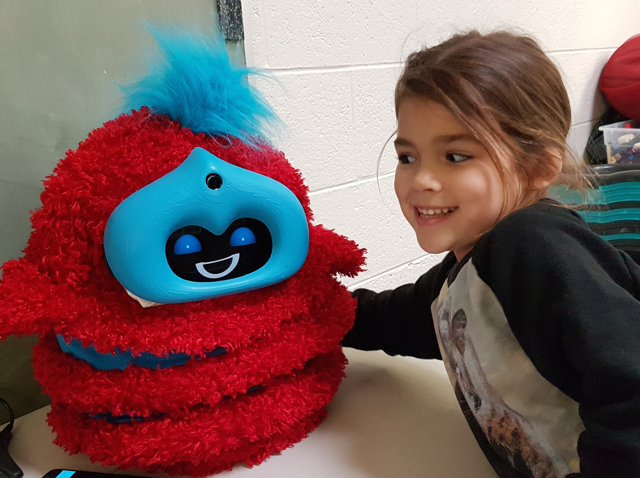
Learning Literacy with Social Robots
Social Robots as Personalized Learning Companions for Early Childhood Learning This project, supported by a National Science Foundation (NSF) grant, is designed to develop new learning games focused on improving children’s vocabulary and early literacy skills. Early language and literacy skills are important foundations for learning and form the basis of later academic success. Motivated by a growing scientific consensus that successful language learning requires engaging students cognitively, affectively, and socially, we are developing, deploying, and evaluating social robot learning companions that help children practice and master early language and literacy skills by engaging with, understanding, and adapting to students to provide scalable, personalized, interactive digital learning systems.
Team
Hae Won Park
Personal Robots Group, MIT Media Lab
Sam Spaulding
Personal Robots Group, MIT Media Lab
Huili Chen
Personal Robots Group, MIT Media Lab
Xiajie (Brayden) Zhang
Personal Robots Group, MIT Media Lab
Safinah Ali
Personal Robots Group, MIT Media Lab
Ishaan Grover
Personal Robots Group, MIT Media Lab
Cynthia Breazeal
Personal Robots Group, MIT Media Lab
Collaborators
Georgia State University, The University of California, Los Angeles, University of Washington
Georgia State University, The University of California, Los Angeles, University of Washington
Publications
S. Ali, H.W. Park, C. Breazeal, “Can Children Emulate A Robotic Non-Player Character’s Figural Creativity?” In Proceedings Of The Annual Symposium On Computer-Human Interaction In Play (2020).
N. Devasia, S. Ali, C. Breazeal, “Escape!Bot: Child-Robot Interaction To Promote Creative Expression During Gameplay” In Extended Abstracts Of The Annual Symposium On Computer-Human Interaction In Play (2020).
H. Chen, H.W. Park, C. Breazeal, “Impact Of Interaction Context On The Student Affect-Learning Relationship In Child-Robot Interaction.” In Proceedings Of The 2020 ACM/IEEE International Conference On Human-Robot Interaction (2020).
H. Chen, H.W. Park, X. Zhang, C. Breazeal, “Teaching And Learning With Children: Impact Of Reciprocal Peer Learning With A Social Robot On Children’s Learning And Emotive Engagement”, In Computers And Education (2020).
S. Ali, T. Moroso, C. Breazeal, “Can Children Learn Creativity From A Social Robot?”, In Proceedings Of The 2019 On Creativity And Cognition.
I. Grover, H.W. Park, C. Breazeal, “A Semantics-Based Model For Predicting Children’s Vocabulary.” In Proceedings Of The 28th International Joint Conference On Artificial Intelligence (2019).
H.W. Park, I. Grover, S. Spaulding, L. Gomez, C. Breazeal, “A Model-Free Affective Reinforcement Learning Approach To Personalization Of An Autonomous Social Robot Companion For Early Literacy Education”, In Proceedings Of The AAAI Conference On Artificial Intelligence (2019).
S. Spaulding, H. Chen, S. Ali, M. Kulinski, C. Breazeal, “A Social Robot System For Modeling Children’s Word Pronunciation: Socially Interactive Agents Track”, In Proceedings Of The International Conference On Autonomous Agents And MultiAgent Systems (2018).
S. Spaulding, G. Gordon C. Breazeal, “Affect-Aware Student Models For Robot Tutors”, In Proceedings Of The International Conference On Autonomous Agents And MultiAgent Systems (2016).
N. Devasia, S. Ali, C. Breazeal, “Escape!Bot: Child-Robot Interaction To Promote Creative Expression During Gameplay” In Extended Abstracts Of The Annual Symposium On Computer-Human Interaction In Play (2020).
H. Chen, H.W. Park, C. Breazeal, “Impact Of Interaction Context On The Student Affect-Learning Relationship In Child-Robot Interaction.” In Proceedings Of The 2020 ACM/IEEE International Conference On Human-Robot Interaction (2020).
H. Chen, H.W. Park, X. Zhang, C. Breazeal, “Teaching And Learning With Children: Impact Of Reciprocal Peer Learning With A Social Robot On Children’s Learning And Emotive Engagement”, In Computers And Education (2020).
S. Ali, T. Moroso, C. Breazeal, “Can Children Learn Creativity From A Social Robot?”, In Proceedings Of The 2019 On Creativity And Cognition.
I. Grover, H.W. Park, C. Breazeal, “A Semantics-Based Model For Predicting Children’s Vocabulary.” In Proceedings Of The 28th International Joint Conference On Artificial Intelligence (2019).
H.W. Park, I. Grover, S. Spaulding, L. Gomez, C. Breazeal, “A Model-Free Affective Reinforcement Learning Approach To Personalization Of An Autonomous Social Robot Companion For Early Literacy Education”, In Proceedings Of The AAAI Conference On Artificial Intelligence (2019).
S. Spaulding, H. Chen, S. Ali, M. Kulinski, C. Breazeal, “A Social Robot System For Modeling Children’s Word Pronunciation: Socially Interactive Agents Track”, In Proceedings Of The International Conference On Autonomous Agents And MultiAgent Systems (2018).
S. Spaulding, G. Gordon C. Breazeal, “Affect-Aware Student Models For Robot Tutors”, In Proceedings Of The International Conference On Autonomous Agents And MultiAgent Systems (2016).

